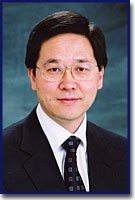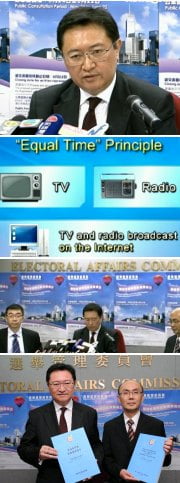Hong Kong is eerily quiet this morning. Normally voluble taxi drivers sit in their cabs in silence. Stunned youthful bemusement replaces the chatter of schoolchildren. Wheelers and dealers put their mobile phones down and stare contemplatively into space. Not a creature stirs, not even a mouse. What on earth, 7 million citizens wonder in astonishment, are these people going on about?
 First there is Constitutional and Mainland Affairs Secretary Stephen Lam’s latest simpering attempt to justify the proposal to ban by-elections for Legislative Council geographic constituencies and fill a vacant seat with the candidate who came next down the list at the election.
First there is Constitutional and Mainland Affairs Secretary Stephen Lam’s latest simpering attempt to justify the proposal to ban by-elections for Legislative Council geographic constituencies and fill a vacant seat with the candidate who came next down the list at the election.
Every vote electors cast will have two effects, announces the rather desperate-sounding minister: firstly, the one we all know about, and…
“Secondly, the more votes they cast for a particular candidate list, the higher the possibility of that candidate list being able to field a candidate as a replacement Legislative Councillor in future, if resignations or other vacancy situations arise … We are building this proposal on the basis of a proportional representation electoral system. This system will enable different lists of candidates to secure seats to the Legislative Council, and to secure the opportunity of allowing candidates on their lists to replace and to field any vacancies in future. So this is in consistency with the concept of proportional representation.”
 While a combined task force of psephologists, logicians, Nobel Prize-winning semioticians and experts on incomprehensible untrustworthy slimebags sets to work to try and establish what Lam is actually saying, a second example of ill-thought-out opaque vagueness appears from nowhere. Electoral Affairs Commission Chairman Justice Barnabas Fung unveils proposed revised guidelines on electoral activities that would require on-line media to follow the same rules as their mainstream counterparts and give a fair hearing to all candidates.
While a combined task force of psephologists, logicians, Nobel Prize-winning semioticians and experts on incomprehensible untrustworthy slimebags sets to work to try and establish what Lam is actually saying, a second example of ill-thought-out opaque vagueness appears from nowhere. Electoral Affairs Commission Chairman Justice Barnabas Fung unveils proposed revised guidelines on electoral activities that would require on-line media to follow the same rules as their mainstream counterparts and give a fair hearing to all candidates.
Some are worried that the guidelines could cover amateur on-line audio streams, teenagers’ video podcasts and even the output of inconsequential bloggers. Fung “refused to say if the ‘undefined public media’ will include internet radio and TV sites, blogs, video sites like YouTube or social networking sites like Facebook.” Everything, he insisted, could only be examined on a case-by-case basis, and – he seemed to suggest – bloggers, teenagers, etc should consult their lawyers before posting anything.
In answering reporters’ questions, Fung was not so much careful with his words as petrified of saying anything definite. So let’s help him out with a dose of firm, unambiguous principles and clarity.
First, the ‘equal time’ guidelines are a hodgepodge of well-intentioned, meaningless blather that probably require a bit of effort to seriously infringe. Second, the penalties for breaking the guidelines are equally vacuous – unless you quake in your boots at the thought of the EAC making a reprimand or censure in a public statement (10.21) about you. Third, Basic Law Article 27 says: “Hong Kong residents shall have freedom of speech, of the press and of publication…” As we all know, the meaning of Basic Law articles may be reversed, inverted, turned inside-out or mangled to shreds by the Standing Committee of the National People’s Congress, but so far this one still stands. Plus there’s the usual UN human rights declarations.
I have no idea why a strange unquestioning meekness grips our – normally cheerily biased – media on the subject of these unenforceable and unconstitutional rules every time an election comes round, to the extent that newspapers suspend political columns and even minimize coverage of any candidates. The simple fact is: you can stuff Judge Barnabas’s ‘equal time’ guidelines.
But we still haven’t a clue what Stephen Lam is saying.

I think what he MEANT to say was “the next person down in the party list gets elevated to the elected position which is in accordence whis a democratic proportional system and means we dont need to hold by elections til we run out of names on the list”
What he actualy said was ” I too important and/or incapable to reading or understanding the proposal that has been carefuly thought out by my department so am going to talk randon bollocks “
The subtext is ; “hey, you say you want democracy? I’m giving each person two votes do you hear, two, and for all you democracy enthusiasts, you’d better be careful of who you allocate your hypothetical second vote to because they might win, dont complain to me then la”.
Presuming, he retains his position in the 2012 Horseman’s administration, Stevie Lam will need to up his game. As Constitutional Head he will need to explain why all FC’s will be retained in 2016 elections (and probably beyond) and how, but not the why, the 2017 CE “elections” will be so skewered, so as to not leave the slightest chance of an undesirable getting the top job. A tough ask and one he will doubtless make a mess of. Oh for a competent Opposition …
NOT A COMMENT FOR POSTING
… just a vague suggestion for a few lines of thought you may want to look at when you’re short of topics for future posts.
In a moment of spare time this afternoon, I was wondering whether Hong Kong had whistleblower protection legislation. This thought came to me when pondering the nature of corruption scandals in the mainland and the question of why, when bribes are given to top level officials, do none of the lower level officials who deal with the execution of regulatory regimes engage in whistleblowing. I suspect it is a combination of insider/outside mentality, the lack of avenues for whistleblowing (eg no ombudsman), lack of whistleblowing culture (more likely to be seen as a fool and traitor than as noble) and the East Asian/Confucian drone tendency to treat words from the mouth of your boss as revealed doctrine.
Anyway, a casual googling couldn’t turn up any whistleblower protection legislation in Hong Kong. However, I was surprised to see that the British did leave us with an ombudsman, who would be someone a whistleblower could approach. However, the list of reports released by the ombudsman in recent years suggests either he/she is not to active or people in HK are just not complaining that much: http://www.ombudsman.gov.hk/investigation_report.shtml
A quick check in the latest 2010 ombudsman report shows a slightly different story – complaints peaked in 2008/9, apparently with the minibond drama being a key driver. 126 full investigations were made. In any case, a quick review of the report and the remainder of the ombudsman site indicated their area of review is pretty low level stuff (water leakage is a big thing), although the illegal structures debacle at the moment could sex up their portfolio. I also couldn’t work out if there actually was an individual vested as ombudsman.
Of course, any sexy stuff that whistleblowers would be about would be covered by the ICAC. They were prominent as a bit of a wild dog a few years ago, but I haven’t seen them do much recently other than that Jockey Club stuff.
The only “whistleblowing” that does seem to happen a lot in Hong Kong and the mainland is the poison pen letters usually seen when a HK or mainland company is approaching IPO, alleging (often somewhat truthfully) corporate misgovernance or financial fraud. However, that often seems motivated by pettiness rather than a strong desire for truth and justice.
Probably all stuff David Webb is more conversant with, but he’s not as droll as yourself.
And I thought I’d deterred LM with my stinging rebuke – he even credited it to Hemlock – a source of some pride. As for Mr Lam’s SV, ATV, GMTV…. most interesting….